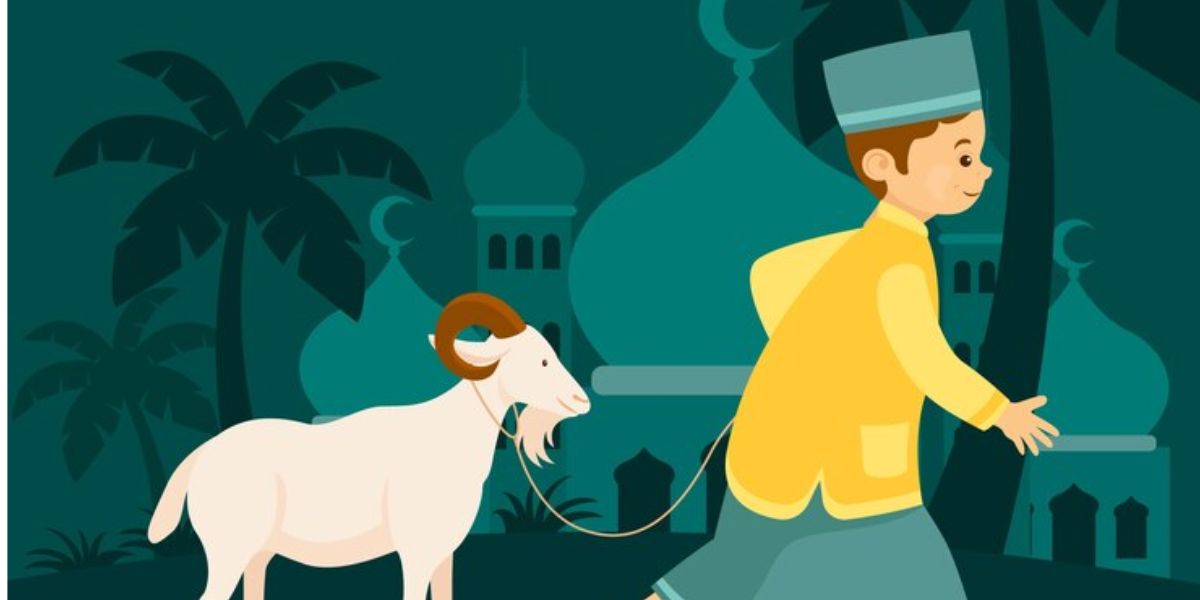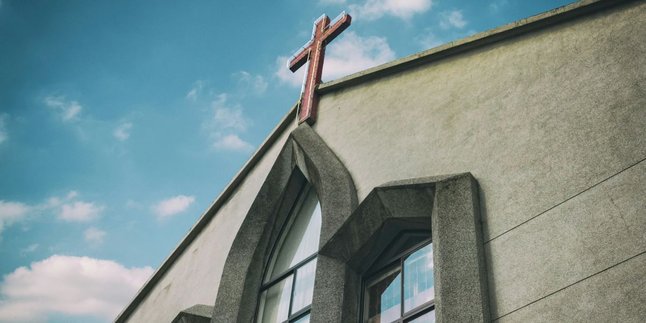Kapanlagi.com - Idul Adha, one of the most significant celebrations in the Islamic calendar, is celebrated every year on the 10th of Dzulhijjah. More than just a day of spiritual victory, Idul Adha is also an important moment for the practice of sacrifice, symbolizing sacrifice and obedience to Allah SWT. However, many of us still do not fully understand the deep meaning of this special celebration.
What does Idul Adha actually mean for Muslims? Why is this holiday so special? Idul Adha is not just an annual tradition, but also contains valuable life lessons. This day reminds us of the story of Prophet Ibrahim, who sincerely faced a great test of sacrifice. Through this celebration, Muslims are taught to draw closer to God through meaningful worship, such as the Idul Adha prayer and the act of sacrifice.
Let us delve deeper into the history, laws, and meaning of Idul Adha. Discover how the act of sacrifice teaches us very important social and spiritual values. Check out this article for deeper insights, as summarized by Kapanlagi.com, Thursday (1/4).
1. The Meaning and Significance of Idul Adha in Islam
According to mui.or.id, Idul Adha has a very profound meaning in Islamic teachings. The word "Idul" comes from the word ‘aada-ya’udu which means return or repeat, while "Adha" comes from the word qurban, which means sacrifice. Thus, Idul Adha means the Festival of Sacrifice that is celebrated every year by Muslims.
This day is commemorated as a manifestation of the obedience of Muslims to Allah SWT through symbolic and real sacrifices. Idul Adha reminds Muslims of the sacrifice of Prophet Ibrahim AS who was willing to sacrifice his son, Prophet Ismail AS, as a form of perfect obedience to Allah. Although in the end Allah replaced Prophet Ismail with a sheep, this event forms the basis of the sacrificial law practiced by Muslims.
The explanation of Idul Adha with the symbolism of sacrifice is elaborated in Al Quran Surat Al Hajj verse 34. Here is the text of the verse and its meaning:
- وَلِكُلِّ أُمَّةٍ جَعَلْنَا مَنسَكاً لِيَرْكُرُوا اسْمَ اللَّهِ عَلَى مَا رَزَقَهُم مِّن بَهِ0644َانـ الْأَنْعَامِ فَإِلَهُكُمْ إِلَوهٌ وَاحِدٌ فَلَهُ أَسْلِمُـلَكُمْ وَبَشِّرِ الْمُخْبِتِينَ
- Meaning: “And for every nation, We have appointed a rite (of sacrifice), that they may mention the name of Allah over the animals He has provided for them. So your God is One God. Therefore, submit to Him and give good news to the humble.” (QS Al Hajj: 34).
As part of the worship that is obligatory for those who are able, the sacrifice on Idul Adha is a symbol of social concern, where Muslims are asked to share the meat of the sacrifice with those in need. Therefore, Eid al-Adha becomes a time to strengthen Islamic brotherhood by sharing blessings with others.
2. A Brief History of Idul Adha
Idul Adha originates from the story of Prophet Ibrahim AS who received a command from Allah SWT in a dream to sacrifice his son, Prophet Ismail AS. Although it was difficult, Prophet Ibrahim AS accepted the command with an open heart and sincerity. When he was ready to carry out the command, Allah replaced Prophet Ismail with a sheep, which was then slaughtered as a sign of perfect sacrifice.
This event is very important in Islamic history as it emphasizes the values of piety and obedience to God. Prophet Ibrahim and Prophet Ismail exemplified perfect obedience to Allah, even if it meant sacrificing the most precious thing in their lives.
As a reminder of this story, Muslims celebrate Idul Adha by slaughtering sacrificial animals as a symbol of their obedience and sacrifice to Allah. Every year, this celebration reiterates the noble values left by these two prophets.
3. Why is Eid al-Adha Recommended for Sacrifice?
Offering a sacrifice during Eid al-Adha is recommended as part of Islamic law, which has many wisdoms. First, the act of sacrifice is an expression of gratitude from Muslims for all the blessings given by Allah SWT. In this regard, the sacrifice becomes a medium to draw closer to God and strengthen spiritual bonds.
Second, the sacrifice teaches Muslims to sacrifice their ego and personal interests for social welfare. The animal that is sacrificed is not only a form of material sacrifice but also a symbol of the willingness to share, especially with those who are less fortunate. The meat from the sacrifice is distributed to the poor, orphans, and those in need, thereby creating a sense of social solidarity.
Through the act of sacrifice, Muslims are also taught about the importance of sincerity and patience in accepting Allah's commands, even when it is difficult or involves great sacrifice. This act serves as a reminder that sincere sacrifices will be rewarded with multiplied rewards.
The explanation of why Muslims are encouraged to make sacrifices is in accordance with the Quran, Surah Al-Kautsar, verses 1 and 2. In its explanation, these verses describe the importance of being grateful for the blessings that Allah has given through various gifts in the world via sacrifice.
- إِنَّا أَعْطَيْنَاكَ الْكَوْثَرَ فَصَلِّ لِرَبًِّكَ وَانْحَرْ
- Meaning: “Indeed, We have given you a great bounty, so pray to your Lord and sacrifice (an animal).” (Al-Kautsar: 1-2).
4. Why is Eid al-Adha Also Called the Feast of Hajj?
According to the website kemenag.go.id, Eid al-Adha is often referred to as the Feast of Hajj because this celebration coincides with the pilgrimage (Hajj) being performed in Mecca. Every year, millions of Muslims performing the Hajj in the Holy Land slaughter sacrificial animals on the same day as Muslims around the world.
At the same time, in Mecca, the Hajj pilgrims will carry out the ritual of slaughtering the sacrifice as part of the series of Hajj worship. Therefore, Eid al-Adha is often called the "Feast of Hajj" because it is closely related to the performance of the Hajj and also serves as a moment for Muslims around the world to gather in the spirit of sacrifice.
In addition, both celebrations share similarities in terms of the values of sacrifice and high togetherness. Both Eid al-Adha and Hajj emphasize the importance of obedience and unity among Muslims in worshiping Allah.
5. The Law of Performing Sacrifice on the Day of Eid al-Adha
The law of sacrificing on the Day of Eid al-Adha is a sunnah mu'akkadah (a highly recommended sunnah) for every Muslim who is able, both financially and physically. This is based on the hadith of the Prophet Muhammad SAW which states that sacrificing is an act that is greatly loved by Allah SWT on the day of Eid al-Adha.
Although it is not obligatory, sacrificing has many virtues, including serving as a means to purify wealth and draw closer to Allah. In addition, the sacrificed animal that is slaughtered will become a witness for the person who performed it in the hereafter, as mentioned in the hadith of the Prophet.
Most scholars agree that a person who is able to sacrifice but does not do so is considered to be wasting this great opportunity for good deeds. Therefore, Muslims are encouraged to sacrifice if they have the ability, both materially and physically.
6. FAQ
What is Idul Adha?
Idul Adha is a holiday for Muslims celebrated with the ritual of sacrifice, coinciding with the pilgrimage (hajj) in Makkah.
Why is Idul Adha called Lebaran Haji?
Idul Adha is called Lebaran Haji because it coincides with the performance of the hajj pilgrimage in Makkah, where the pilgrims sacrifice animals.
What is the meaning of the sacrifice ritual on Idul Adha?
The sacrifice ritual on Idul Adha symbolizes sacrifice, social solidarity, and obedience to Allah SWT.
What is the ruling on sacrificing on Idul Adha?
Sacrificing on Idul Adha is a sunnah mu’akkadah for every Muslim who is able, and it is highly recommended as a form of worship.
What is the history of Idul Adha?
Idul Adha originated from Allah's command to Prophet Ibrahim to sacrifice his son, Prophet Ismail, who was then replaced by a sheep as a form of Allah's mercy.
(kpl/rmt)
Disclaimer: This translation from Bahasa Indonesia to English has been generated by Artificial Intelligence.












